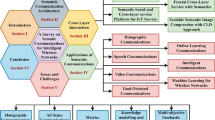Abstract.
An overlay smart spaces system, called MITOS, is proposed for managing the use of the resources in wireless local area networks (WLAN). MITOS monitors the traffic load distribution in the different WLAN segments, as well as the location of each user, and when necessary, suggests to specific users to change their location in order to improve their quality of service. Enhancements to the basic MITOS architecture are introduced to intelligently manage local congestion, and maintain an almost uniform load level across the network. The approach used for load balancing is based on game theoretic mechanisms, such as the solutions to the Santa Fe Bar Problem. Simulation results are provided showing the efficiency of the proposed system.
Similar content being viewed by others
References
M. Satyanarayanan, Pervasive computing: Vision and challenges, IEEE Personal Communications (Aug. 2001).
P. Castro, P. Chiu, T. Kremenek and R. Muntz, A probabilistic room location service for wireless networked environments, in: Proceedings Ubicomp (2001).
G. Papazafeiropoulos, N. Prigouris, G.F. Marias, S. Hadjiefthymiades and L. Merakos, Retrieving position from indoor WLANs through GWLC, in: Proceedings of the IST Mobile & Wireless Communications Summit, Portugal (June 2003).
http://mmsl.cs.ucla.edu/nibble/, The Nibble Location System (May 2001).
D. Fox, J. Hightower, L. Liao, D. Schulz and G. Borriello, Bayesian filtering for location estimation, IEEE Pervasive Computing (July 2003).
J. Hightower and G. Borriello, Location systems for ubiquitous computing, IEEE Computer (Aug. 2001).
W.B. Arthur, Inductive reasoning and bounded rationality (the El Farol Problem), Amer. Econ. Review (Papers and Proceedings) (1994).
A. Greenwald, B. Mishra and R. Parikh, The Santa Fe Bar Problem Revisited: Theoretical and Practical Implications (Dec. 1998).
D.C. Parkes and D. Steinig, The Santa Fe Bar Problem: A Study in Multiagent Learning.
J. Farago, A. Greenwald and K. Hall, Fair and efficient solutions to the Santa Fe Problem, in: Proceedings of the Grace Hopper Celebration of Women in Computing 2002, Vancouver (Oct. 2002).
J.D. Thomas and K. Sycara, Heterogeneity, stability, and efficiency in distributed systems, in: Proceedings of the 1998 International Conference on Multi Agent Systems (July 1998).
T. Grenager, R. Powers and Y. Shoham, Dispersion Games: General Definitions and Some Specific Learning Results, AAAI (2002).
A. Orda, R. Rom and N. Shimkin, Competitive routing in multiuser communication networks, IEEE/ACM Transactions on Networking (Oct. 1993).
H. Yaiche, R.M. Mazumdar and C. Rosenberg, A game theoretic framework for bandwidth allocation and pricing in broadband networks, IEEE/ACM Transactions on Networking (Oct. 2000).
K.V. Srikanth, Network routing problems using game theory, Report for the Degree of Bachelor of Technology (2001).
M. Littman and J. Boyan, A distributed reinforcement learning scheme for network routing, Tech. report CMU-CS-93-165, Robotics Institute, Carnegie Mellon University (1993).
J.B. Rosen, Existence and uniqueness of equilibrium points for concave N-person games, Econometrica 33(3) (1965).
R.D. Luce and H. Raiffa, Games and Decisions: Introduction and Critical Survey (John Wiley and Sons, 1957).
A. Balachandran, G.M. Voelker, P. Bahl and P.V. Rangan, Characterizing User Behavior and Network Performance in a Public Wireless LAN, SIGMETRICS (2002).
D. Tang and M. Baker, Analysis of a local-area wireless network, in: Proceedings of ACM MobiCom’00.
D. Kotz and K. Essien, Analysis of a campus-wide wireless network, in: Proceedings of ACM MobiCom’02.
A. Balachandran, P. Bahl and G. Voelker, Hot-spot congestion relief and user service guarantees in public-area wireless networks, in: Proceedings of ACM WMCSA’02, NY, USA (June 2002).
Agere Systems, Firmware Update for ORINOCO PC Cards v7.28—Spring 2001 release (April 2001).
“Ekahau Positioning Engine 2.1 - User Guide”, Ekahau Inc, 2003.
P. Bahl and V.N. Padmanabhan, RADAR: An in-building RF-based user location and tracking system, microsoft research, in: Proceedings of INFOCOM (2000).
J. Schiller and A. Voisard, Location-Based Services (Morgan Kaufmann, 2004).
J. Cuellar, J. Morris, D. Mulligan, J. Peterson and J. Polk, Geopriv requirements, IETF RFC 3693 (Feb. 2004).
Author information
Authors and Affiliations
Corresponding author
Additional information
The research of the author for his PhD studies is supported by the Alexander S. Onassis Foundation Scholarship Programme.
George Alyfantis received his B.Sc. degree in Informatics and Telecommunications from the Department of Informatics and Telecommunications, University of Athens, Athens Greece, in 2002. He received his M.Sc. degree in Communication and Network Systems from the same Department, in 2003. Since 2001, he is a member of the Communication Networks Laboratory (CNL) of the University of Athens. Currently, he is working towards his Ph.D. thesis. His research interests include pervasive/mobile computing, middleware for wireless sensor networks, web caching performance and game theory. He is the author of 5 papers in the aforementioned areas. In the course of his studies he received numerous distinctions like the Alexandros Onassis Foundation Scholarship for his Ph.D. studies, the best student award of the Department of Informatics and Telecommunications for graduating first in his B.Sc./M.Sc. class and the best M.Sc. thesis Ericsson Award of Excellence in Telecommunications 2004.
Stathes Hadjiefthymiades received his B.Sc. (honors) in Informatics from the Department of Informatics at the University of Athens, Greece, in 1993 and his M.Sc. (honors) in Informatics (Advanced information systems) from the same department in 1996. In 1999 he received his Ph.D. from the University of Athens (Department of Informatics and Telecommunications). In 2002 he received a joint engineering-economics M.Sc. degree from the National Technical University of Athens. In 1992 he joined the Greek consulting firm Advanced Services Group, Ltd., where he was involved in the analysis and specification of information systems and the design-implementation of telematic applications. In 1995 he became a member of the Communication Networks Laboratory (UoA-CNL) of the University of Athens. During the period September 2001–July 2002, he served as a visiting assistant professor at the University of Aegean, Department of Information and Communication Systems Engineering. On the summer of 2002 he joined the faculty of the Hellenic Open University (Department of Informatics), Patras, Greece, as an assistant professor. Since December 2003, he is in the faculty of the Department of Informatics and Telecommunications, University of Athens, where he is presently an assistant professor. He is coordinating the Pervasive Computing Research Group of the Dept. of Informatics and Telecommunications at the University of Athens. He has participated in numerous projects realized in the context of EU programs (ACTS, ORA, TAP, and IST), EURESCOM projects, as well as national initiatives. His research interests are in the areas of web engineering, wireless/mobile computing, and networked multimedia applications. He is the author of over 80 publications in the above areas.
Lazaros Merakos received the Diploma in electrical and mechanical engineering from the National Technical University of Athens, Athens, Greece, in 1978, and the M.S. and Ph.D. degrees in electrical engineering from the State University of New York, Buffalo, in 1981 and 1984, respectively. From 1983 to 1986, he was in the faculty of the Electrical Engineering and Computer Science Department University of Connecticut, Storrs. From 1986 to 1994 he was in the faculty of the Electrical and Computer Engineering Department, Northeastern University, Boston, MA. During the period 1993–1994, he served as director of the Communications and Digital Processing Research Center, Northeastern University. During the summers of 1990 and 1991, he was a visiting scientist at the IBM T. J. Watson Research Center, Yorktown Heights, NY. In 1994, he joined the faculty of the University of Athens, Athens, Greece, where he is presently a professor in the Department of Informatics and Telecommunications, and director of the Communication Networks Laboratory (UoA-CNL) and the Networks Operations and Management Center. Since 1995, he is leading the research activities of UoA-CNL in the area of mobile communications, in the framework of the Advanced Communication Technologies and Services (ACTS) and Information Society Technologies (IST) programs funded by the European Union (projects RAINBOW, Magic WAND, WINE, MOBIVAS, POLOS, ANWIRE, E2R, LIAISON). His research interests are in the design and performance analysis of communication networks, and wireless/mobile communication systems and services. He has authored more than 190 papers in the above areas. Dr. Merakos is chairman of the board of the Greek Universities Network, the Greek Schools Network, and member of the board of the Greek Research Network. In 1994, he received the Guanella Award for the best paper presented at the International Zurich Seminar on Mobile Communications.
Rights and permissions
About this article
Cite this article
Alyfantis, G., Hadjiefthymiades, S. & Merakos, L. An Overlay Smart Spaces System for Load Balancing in Wireless LANs. Mobile Netw Appl 11, 241–251 (2006). https://doi.org/10.1007/s11036-006-4476-6
Published:
Issue Date:
DOI: https://doi.org/10.1007/s11036-006-4476-6




